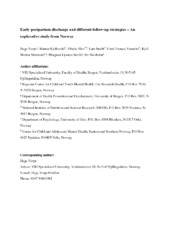Early postpartum discharge: maternal depression, breastfeeding habits and different follow-up strategies
Verpe, Hege; Kjellevold, Marian; Moe, Vibeke; Smith, Lars; Vannebo, Unni Tranaas; Stormark, Kjell Morten; Søvik, Margaret Ljosnes; Skotheim, Siv
Peer reviewed, Journal article
Accepted version
Permanent lenke
https://hdl.handle.net/1956/19693Utgivelsesdato
2019-03Metadata
Vis full innførselSamlinger
Originalversjon
https://doi.org/10.1111/scs.12604Sammendrag
Background: In most maternity wards in Norway, early discharge (<48h) is the norm. To monitor newborns’ and women’s health during the first week after delivery, most maternity wards offer early check-ups, were families return to the hospital (standard care). However, a few municipalities offer home-visits by midwives (domiciliary care), to ensure seamless services for the family. Aim: The primary aim of this study was to explore if different follow-up strategies were differently associated with maternal depression and breastfeeding habits, six weeks and six months postpartum. The secondary aim was to investigate if families at risk for postpartum depression were included in the home visiting program in the municipality that offered both follow-up strategies. Method: This study draws on data from the “Little in Norway” (LIN) study, which followed families from pregnancy until the child was 18 months. The present study used data from two different municipalities, where one offered standard care (n=95) and the other domiciliary (n=64) and standard care (n=17). The Edinburg postnatal depression scale (EPDS) was used to measure maternal depression. Breastfeeding habits were measured using a self-reported questionnaire. The Life Stress subscale of the Parenting Stress Index (PSI) was used to identify women at risk for postpartum depression. Results: There were no differences in maternal depressive symptoms or breastfeeding habits at neither six weeks nor six months postpartum between women that received standard or domiciliary care in the two municipalities. Within the municipality that offered both follow-up strategies a higher number of women scoring high on prenatal Life Stress were included in domiciliary- compared to standard care. Conclusion: Differential follow-up strategies in the first week after birth did not impact on maternal depression or breastfeeding habits. However, domiciliary care seems to be regarded as supportive and non-stigmatizing for women at risk for postpartum depression.
